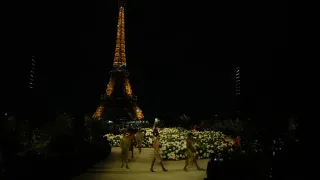
Sep 29
Comic Artist Adam Ellis Faces Wave of Threats After Pro-Trans Webcomic
READ TIME: 3 MIN.
Adam Ellis, a prominent American artist recognized for his widely shared webcomics, has become the target of significant online abuse after publishing a comic that satirizes anti-transgender hysteria. On September 26, 2025, Ellis posted the comic to his social media accounts. The artwork depicts a scenario in which a trans woman is confronted by an individual who, influenced by inflammatory online discourse, accuses her of being part of a "death cult" and a "terrorist." The comic’s final panel subverts this narrative, showing the trans woman peacefully playing video games while wearing a clay face mask, underscoring the absurdity of the accusations leveled against transgender people .
In the days following its publication, Ellis reported receiving numerous death threats. He described the volume and intensity of the harassment as unprecedented, attributing it directly to the comic's message and its visibility on social media platforms . In a post on the Bluesky social network, Ellis detailed a particularly targeted form of harassment: users reported his accounts to suicide prevention hotlines, an act he described as a way for abusers to tell him to "kill yourself" while evading platform bans .
The backlash against Ellis occurs against a backdrop of escalating hostility toward transgender people in the United States and globally. In recent months, right-wing groups and some conservative think tanks have intensified their rhetoric, labeling transgender activism as "extremism." Earlier in September, The Heritage Foundation, a conservative organization, petitioned the FBI to classify "trans ideology" as a terror threat, referencing a high-profile shooting incident involving a conservative media figure. Notably, the individual charged in that case did not publicly identify as transgender, highlighting the disconnect between the rhetoric and actual events .
Data from recent years contradicts claims that transgender people are responsible for a disproportionate share of violence or extremism. Studies indicate that the overwhelming majority of extremist violence in the United States is perpetrated by individuals with right-wing or white supremacist affiliations, not transgender people. Of more than 3,700 mass shooting incidents since 2015, only a small fraction—about 16—have reportedly involved publicly transgender individuals .
These developments have been accompanied by calls from some public figures, such as U.S. Representative Ronny Jackson, for transgender people to be "removed from public life and institutionalized," a stance widely condemned by LGBTQ+ advocates as dangerous and discriminatory .
Ellis has responded to the harassment with both defiance and concern for the state of online discourse. He posted a screenshot of a message received via Reddit's care resources, which cited a "concerned redditor" and listed mental health support networks. Ellis called this form of reporting "deeply cringe" and highlighted the irony in being targeted for supporting trans people’s right to exist peacefully .
The artist’s experience is emblematic of the risks faced by LGBTQ+ creators who speak out against discrimination. Social media platforms have become both a site of community and a battleground, where supportive messages can be met with waves of vitriol, coordinated reporting, and threats. Advocacy organizations stress the need for better moderation practices and robust support systems for individuals facing harassment .
Despite the threats, Ellis’s comic has also garnered significant support from the LGBTQ+ community and allies online. Many users have lauded his willingness to address anti-transgender narratives head-on, arguing that visibility and honest representation are critical in challenging misinformation and prejudice. The positive response underscores the importance of creators who use their platforms to advocate for inclusive and accurate depictions of transgender lives .
Ellis’s situation has prompted renewed calls for solidarity and resilience within LGBTQ+ spaces. Advocacy groups emphasize the need for both immediate and systemic responses to online hate, including improved reporting mechanisms, community-led support, and policy changes at the platform level . Many see Ellis's experience as a reminder of the ongoing struggle for acceptance and safety faced by transgender people and their allies.
The targeting of Adam Ellis following his pro-transgender comic highlights the persistent dangers faced by those who speak out against anti-LGBTQ+ rhetoric. While online platforms remain fraught with risk for marginalized voices, the solidarity shown by community members and advocacy organizations serves as a testament to the enduring power of representation and the ongoing fight for equality.






